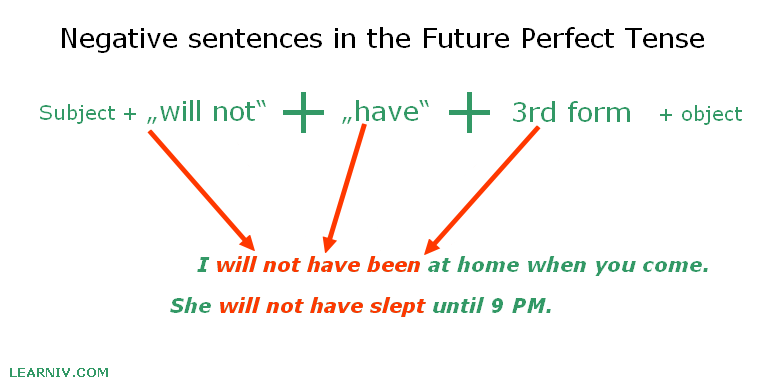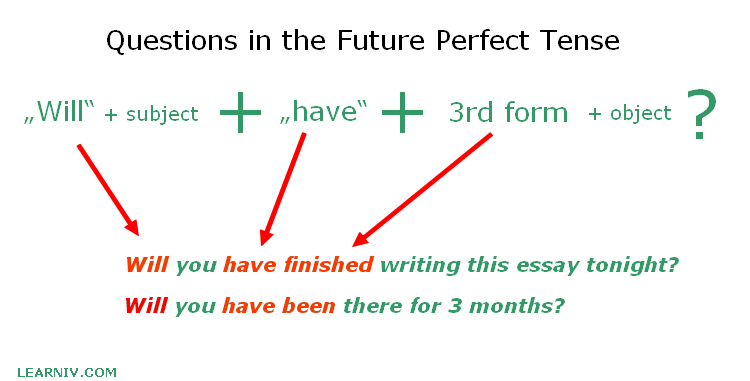The future perfect tense is used to describe events in the future. Despite the fact that this tense is hardly used in ordinary conversation, it is still necessary to know it.
The future perfect tense is very similar to the past perfect and present perfect tenses and is formed with the same principle. It is used most often in written speech and formal reports – we don’t come across it much in speech.
Look at the future perfect tense examples.
Tense formation
The formation of the future perfect simple tense is a little more complicated than that of the future simple tense. The base of the sentence consists of the auxiliary verb “will”, the verb “have” and the 3rd form of a verb (past participle). If the verb is regular, we add the suffix -ed to its base.
The general form of sentences will therefore use the following verbs:
Will + have + past participle
Affirmative sentences
The formation of affirmative sentences in the future perfect tense involves the use of three basic verbs. This includes the use of the verb WILL which shows the future aspect, as well as the verb HAVE which is used in various forms in the past, present and future perfect.
The last verb used is the main verb, which gives the sentence meaning and purpose and is used in its irregular form (past participle – 3rd form). If the verb is regular (has no alternative form), we add only the suffix -ed.
The general form of affirmative sentences is:
Subject + will + have + past participle + object.
Example:
– She will have married on Friday.
– I will have cooked for tomorrow’s lunch.
– They will have left Norway after 3 weeks.
Negative sentences
The formation of negative sentences is quite similar to that of positive sentences. The only thing that changes here is the addition of the negative “not” right after the auxiliary verb WILL. The rest of the sentence is exactly the same.
The structure of negative sentences looks like this:
Subject + will + not + have + past participle + object.
Example:
– I will not have been at home when you come.
– They will not have played football until they finish their homework.
– She will not have slept until 9 PM.
Questions
Questions in the future perfect tense are relatively simple if we already know the principle of forming affirmative and negative sentences. There is just a simple change in the verb order where the verb WILL is placed at the very beginning of the sentence. The rest of the structure is identical to that of affirmative sentences.
Interrogative sentences in the future perfect tense look like:
Will + subject + have + past participle + object?
Example:
– When will we have left Japan?
– Will you have finished writing this essay tonight?
– Will you have been there for 3 months?
Use of the future perfect tense
The future perfect tense is used to express events that will be completed in the future before another given point in time also in the future. It can be also marked by the beginning of another event in the future.
Completed future events
The future perfect tense represents events that will be completed at some precise point in time. These events may be terminated by another event or by a precise time interval. The tense therefore emphasizes moments that will have already been completed in the future.
Example:
- I will have finished all of my homework by next Monday.
- By this time next year, I will have lived in my new flat.
- She will have written a whole article.
- Will you have eaten when we come there?
- I will have been there for two and half years next month.
- When he gets home, I will have cleaned the kitchen.
All sentences in the future perfect tense are marked with a time interval or other event that indicates the completion of the action.
Prepositions
This tense is very often expressed through the use of various prepositions. The most common ones are “by”, “before” or “after”, which are used only to express completed events in the future.
By, before and after
The future perfect tense is very often used in conjunction with the preposition “by”, which here expresses the timeline.
- By tomorrow
- By next month
- By 2030
- By the time he comes
- By then
But it is also often used in combination with the prepositions “before” or “after”.
- I will have been there right after him.
- He will not have left before he comes.
The future simple tense vs. the future perfect tense
While the future simple tense deals with when the action will take place, the future perfect tense deals more with when the action will have been completed. It does not concern itself much with the process of the action, but rather with its end.
Example:
- She will do it on Monday.
(the action will take place on Monday)
- She will have done it on Monday.
(We don’t know exactly when the action will take place, but we know that it will be finished on Monday.)
In some cases, the difference is very minimal yet it alters how we understand the event.
- I will leave before 2 PM.
(I will leave at 2 PM sharp – I know when I will leave).
- I will have left before 2 PM.
(I will leave sometime before 2 PM – I don’t know exactly when yet).
The difference here is that the future simple tense announces when the action will take place, while the future perfect tense announces when the action will be completed.
- The movie will start when we come.
(The movie will start simultaneously as we arrive – we will catch it).
- The movie will have started when we come.
(The film will start before we arrive – we will not be able to catch the start because we are late).
Abbreviation of the verb WILL
Similar to auxiliary verbs, the verb WILL uses abbreviations which make it possible to have a more fluent conversation. Abbreviations are mostly used when talking to family and loved ones.
We tend to never use abbreviations for formal conversations, emails or any other form of communication as this can come across as rude or impolite. Therefore, it is better to avoid the use of abbreviations in such conversations.
Abbreviation of WILL
The verb WILL is abbreviated by “‘ll”, apostrophe included. This abbreviation is added to the subject (pronoun) to form one word.
- I will have done this. –> I’ll have done this.
- She will have lived in the UK. –> She’ll have lived in the UK.
- They will have watched TV. –> They’ll have watched TV.
Abbreviation of WILL NOT
In negative sentences, the abbreviation of the verb WILL NOT is “won’t” and it is added after the pronoun.
- They will not have listened to this music. –> They won’t have listened to this music.
- She will not have gone out with her tomorrow. –> She won’t have gone out with her tomorrow.
- I will not have ironed laundry next week. –> I won’t have ironed laundry next week.




